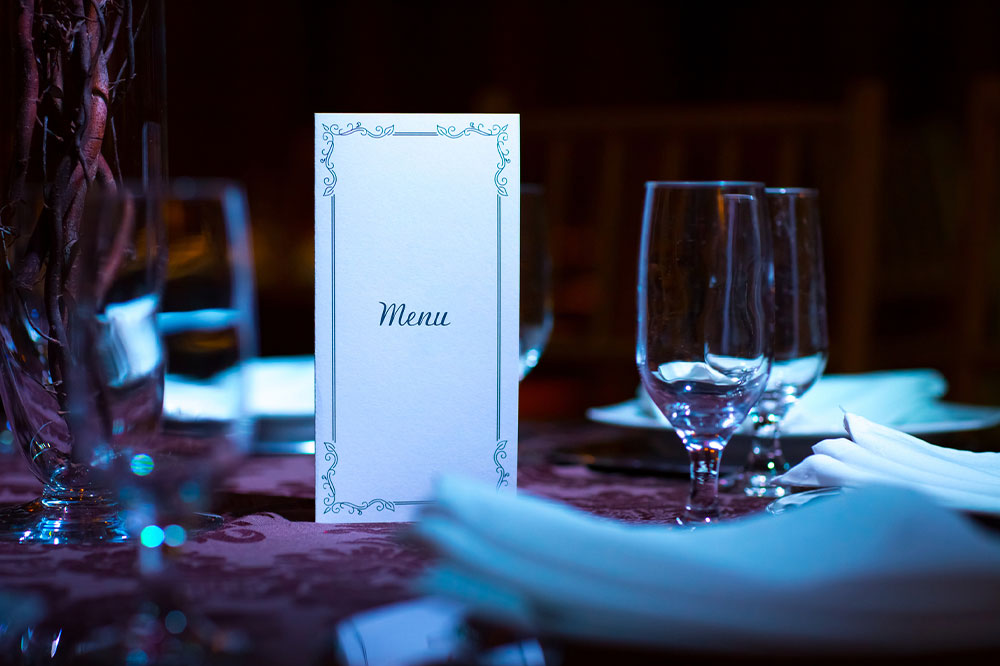7 Types of Menus Offered by Restaurants
Running a successful restaurant is more than just serving well-cooked food. The staff must work on creating a great ambiance and choosing the right meals to serve. More importantly, they must ensure that the menu reflects the restaurant’s quality and contributes to building its reputation and identity. They must also create a menu that communicates all the key details, like the cuisine the restaurant serves, prices for each preparation, and available meal combinations.

À la carte
The French term à la carte means “by the menu.” Such a menu simply lists all the items available at the particular restaurant and prices them separately. The biggest benefit of having this type of menu is the flexibility provided to guests. They can choose an item to enjoy individually and even combine different cuisines. Guests also have to pay for each main and side dish ordered. Of course, such a menu means the guest has to shell out a lot more than the other menus we’ll be discussing.
Du jour
Another popular menu style that is frequently seen in small and big restaurants across the globe is du jour —another French term that translates to “for the day.” Items featured on such a menu are usually special and are available only on particular days. Some restaurants plan and customize their weekly menus and ensure that they offer a few specialty items every day of the week. You will usually find these menus freshly scribbled on chalkboards or displayed on TVs or screens. A du jour may also have single items of multiple daily entrées, soups, and cocktails or may be present with prices, depending on the place of your choice.
Cycle
Du jour menus give you the specialties of the particular day, which is why restaurants change daily. But you may also want to change your menu on the basis of the seasonal availability of certain ingredients and the chef’s choices. An ideal way to periodically make these changes is by adopting a cycle menu. Cycle menus feature all the current and upcoming items offered by the restaurant. Many restaurants use weekly or monthly cycle menus because the food is cooked on the same equipment that is present in the kitchen. These menus are typically used by resorts, bars, hotels, cruise ships, and even hospitals.
Buffet
A buffet menu offers several dishes as part of the service and often requires guests to pay a per-person rate. You can enjoy a wide spread of appetizers, main courses, and desserts. During a buffet service, the guests usually have to help themselves to the food. Such a menu is always pre-determined and decided when you book the service, which is the perfect choice for weddings and other special occasions. This type of restaurant menu is also a lot more affordable compared to à la carte . Some restaurants even offer unlimited servings as part of the buffet menu.
Beverage
When it comes to menus, many restaurants offer various beverage choices. So, you could be handed a separate menu containing a selection of wines, cocktails, juices, and even sodas. Guests usually start with water but want to switch to other drinks later during the meal. These restaurant menus usually list each item individually along with its price. The ingredients are usually mentioned in the case of cocktails and mocktails, and professional pictures of these beverages are shown. Some restaurants also mention the tradition behind certain libations.
Dessert
Many restaurants offer the dessert menu as part of their à la carte . But they also often take away these menus once the guests have ordered their appetizers and main course items. So, guests cannot refer to or check out the dessert menu once they’re done with their food. To tackle this inconvenience, some restaurants have started offering dessert menus displayed directly on the table or handed out once the guests are done with the main course. When visiting a fine-dining restaurant, you may notice a dessert cart being rolled out. This cart contains all the items on the day’s dessert menu.
Static
Unlike the cycle menu, a static one does not change often or even at all. This type of restaurant menu is large, is divided into categories, and is one of the most used menus across the world. A non-changing menu makes serving the guest a lot easier they know what to expect when they enter the restaurant and order a particular item off the list. These types of menus also have everything. So, they have appetizers, main courses, buffet items, à la carte , beverages, and drinks, all mentioned in one booklet.
The next time you visit a restaurant, you’ll be easily aware of the menu style that has been adopted by referring to the ones mentioned above. Every cafe, bar, and restaurant follows either one of these seven styles to make sure customers keep coming back.